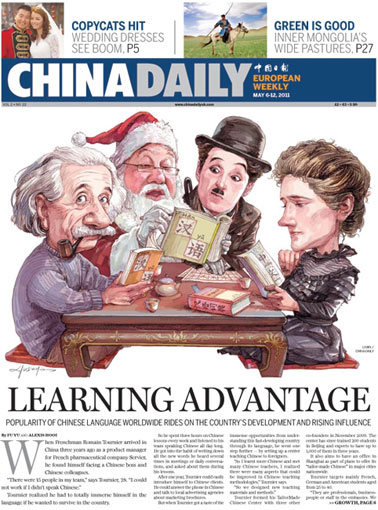Opening accounts to scrutiny
Updated: 2011-05-06 10:32
(China Daily European Weekly)
One paradox in Chinese administrative reality has been the governments that invariably address themselves as "the people's" yet keep their account books away from us.
The recent push toward greater financial transparency is an inescapable move to make the establishment truly "the people's". The rhetoric about public oversight of the government sounds hollow when society is kept in the dark as to how taxpayers' money is being spent.
We share Premier Wen Jiabao's worries that the budgetary information available lacks specifics and falls short of public expectations. He proposed that information sharing be broader in scope, rich in details, and accessible to the general public and said that budgetary transparency is of essential significance for democratic politics.
The promise to guarantee the rights of people to know, to participate and to supervise should not be just empty words.
We are all for government institutions making public their sangong expenses, that is the money spent on overseas trips, receptions and vehicle purchases and maintenance.
Sangong singles out three of the most criticized areas for the rampant squandering of taxpayer money by public officials, areas that at the same time are considered hotbeds for corruption.
Government offices at all levels share an obligation to offer all the necessary specifics about these expenditures so people can make informed judgments about whether or not they have exercised the kind of self-discipline they always claim.
The public has an indisputable and unequivocal right to know sangong expenses, and know in detail. The modern means of communication, especially the websites of various governments, make it easy for officials to accomplish this not so difficult task.
Given their historical pattern of spending, government institutions are no doubt shy about revealing such expenses. The Ministry of Science and Technology was the only one of the 98 central government agencies that included sangong expenses in its 2011 budgetary report. And even this ministry has been less than specific about such expenses.
The good thing is, with the public's persistent preoccupation with sangong, there is little chance they can carry on being so reticent.
The immediate concern about sangong, however, should not blind us to the larger picture of budgetary transparency. We need to implement a mechanism whereby both the public and their elected representatives can practice meaningful oversight over the way taxpayers' money is utilized.
Our legislatures, the people's congresses at national and local levels, must have full access to government budgetary information or it will be impossible for lawmakers to make informed decisions about government budgets.
E-paper

Head on
Chinese household care goods producers eye big cities, once stronghold of multinational players
Carving out a spot
Back onto center stage
The Chinese recipe
Specials

Bin Laden dead
The world's most wanted man was killed in a US raid in Pakistan.

British Royal Wedding
Full coverage of the royal wedding of Prince William and Kate Middleton in London. Best wishes

The final frontier
Xinjiang is a mysterious land of extremes that never falls to fascinate.
